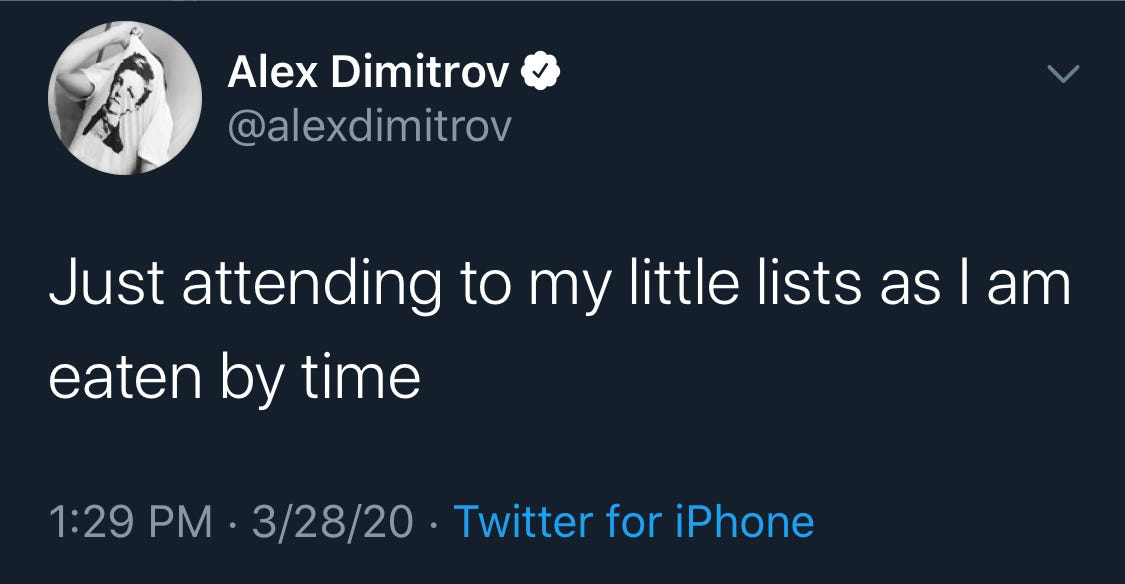We Were Entrusted By Nature With The Ownership Of This Single Thing
Nothing is ours, except time.
For the past seven years I have kept a small corkboard at my desk. With a few minor exceptions around the edges—a Christmas photo of my niece and me, a bumper sticker from Labor Notes’ “Troublemakers School,” a Mary Oliver verse that a friend typewrote and mailed me—the contents of the board haven’t changed since 2014. On it are pinned 19 index cards that each contain a pithy quote that gives advice on life or writing. Or both, in some cases: that year was the first time I stopped thinking I might want to be a writer and just started writing, and also the first time I began to realize that my brain chemistry was not as immutably stable as I had supposed.
I borrowed some of these from existing literature I admired: You will become way less concerned with what other people think of you when you realize how seldom they do, for instance. (From 2012-2013 I read Infinite Jest three times. You don’t do that without it leaving a mark. Yes I know how this sounds.) Others I took from role models in my own life: What a hammer is and what a hammer does are two completely different things was a favorite saying of my favorite high school teacher, who years later ended up officiating my wedding. Some I took from music, and while I cringe thinking about 23-year-old me listening to some late night Jason Mraz and physically writing down Go make a life, not a living…well, if it’s a corny sentiment it’s only because it’s honest.
But there’s one card in particular that I’ve been ruminating on lately, the source of which is a letter from Seneca to Lucilius that I had to look up for this piece because it’s been a long while. It reads, simply: Nothing is ours, except time.
A few weeks after I originally tacked that up, Kate, a friend of my wife’s, was in town, and she made a beeline for it. “That’s not true at all,” she said. “I don’t feel like much of my time is my own at all.”
Kate was right, of course. But so was Seneca.
Seneca wrote that letter to Lucilius to remind his friend that life is fleeting and precious, the kind of truism that feels trite without a concrete sadness to anchor it. But his letter includes another line that clarifies and justifies the first:
We were entrusted by nature with the ownership of this single thing, so fleeting and slippery that anyone who will can oust us from possession.
Time, in other words, is “ours” because it is the only thing we are guaranteed to possess in any quantity in this life. Its boundaries of birth and death impose a finitude on all else we could hope to own or have. And through the ages, from the pre-Christian slave empires of Europe to present-day liberal democracy, the systems under which we live demand that we sell that time for far less than it’s worth. (Not that such a thing can be measured, but basically no one is paid even close to the value they produce for an employer, either.)
It is this knowledge which makes me desperate, and it is this desperation that makes me a socialist. There are things necessary for society to carry on that no one wants to do, certainly. But that doesn’t mean we have to keep doing things this way, condemning so many billions of people to poverty and misery. We all get exactly one life, and the conditions that so many people live and labor under shorten its span while lengthening and spoiling its days. I am a talented sleeper but on the rare nights I don’t get enough of it it is because of thoughts like this.
(Lest you think I’m painting myself as a pure altruistic being here, know that some of this desperation is for myself, too. I’m mostly doing alright. But these conditions do compel me to spend much of my precious, finite time organizing and fighting in my union and in DSA. It is occasionally soul-healing work, and in doing it and participating in shared struggle I have met people I care about dearly. And yet I would vastly prefer a future in which I didn’t have to keep doing that indefinitely, or even for much longer. There’s so much else I’d like to do.)
While there are certainly people in this world who have it worse than teachers, they’re not exactly thriving right now, either. In a normal year it’s a hard enough job; since spring of last year it has been nearly an impossible one. But in this diseased country where we always need someone to blame except for the people who are actually to blame, teachers—especially unionized teachers—have become the new favorite punching bags of politicians, media members, and in my lucky case, the presidents of our own unions.


For the blessedly unfamiliar, that op-ed is written by Randi Weingarten, the president of the American Federation of Teachers; and Rajiv Shah, the president of the Rockefeller Foundation. We used to have some degree of pride in this country and the only time you would see a union leader and a Rockefeller in the same headline was when the former was standing up to the latter and getting killed for his trouble. That Shah is also a former adminstrator for USAID, a well-known CIA front, is just the icing on the cake; you’d need more than your fingers and toes to count the Left labor leaders the CIA has killed worldwide over the years.
How did this happen? Because with the decimation of the labor movement during the last 40 years of neoliberal policy has come an “any port in a storm” mentality in labor leadership. Accordingly, many union leaders are far more willing to accept the bipartisan consensus that we must get back to business as usual—and sell that lie to their members—than they are to accept that we must fight tooth and nail to keep people alive.
Testing, expected to cost about $22.7 billion for the spring semester, will give us the option to reopen some primary public school buildings safely for those who can and want to be there. With the benefits of recent data and experience, we know we can make elementary and middle schools far safer, although high schools may take more time. By leveraging breakthroughs in test production, investing in protocols and infrastructure, and of course, prioritizing getting teachers vaccinated, we can minimize risks enough for everyone to trust being back in a classroom.
…To open the nation’s primary schools, the United States will need more than 200 million tests each month. Thanks to advances in technology and test production, more than that number of tests will be available starting March 1, though several regional and national laboratories will need to be ramped up to get test results reliably and regularly back to schools within 24 hours.
What Weingarten and Shah outline in their article is literally fiction: a depiction of a world that you and I might like to live in, but surely doesn’t exist. They undercut their own logic at every turn (see the lines about high schools and laboratories, in particular, for a laugh) and then plow ahead with the same line of argument regardless. To publish an article like this in the same week that the Chicago Teachers Union, an AFT affiliate, announced that teachers will refuse to return to in-person schooling and will strike if the city attempts to make them go back, is particularly heinous.
The angle of privatizers like Shah is easy enough to see here. It is to the benefit of the capitalist class to defang or destroy teachers’ unions, which are among the last bastions against the total dismantling of American public infrastructure. Weingarten, then, might seem like a useful idiot, or perhaps someone who believes what teachers find most important in the world is teaching, regardless of consequence. She is neither. What Weingarten—who tweeted fawningly about billionaires Michael Bloomberg and Tom Steyer during the Democratic primary, and shared a benefit stage with Rahm Emanuel the same day Chicago teachers were out on strike against his government—wants is for the union she runs to remain politically relevant without being politically threatening.
There is a full-court press against teachers’ unions at the moment, the target du jour for America’s pandemic frustrations. The Washington Post put out their own laughable attempt to paint schools as totally safe for reopening this week. See how many gems you can spot in these two paragraphs:
Still, Honein said, even in places with high infection rates, there is no evidence that schools will transmit the virus at rates that are any higher than those seen in the general community. She said they can operate safely as long as precautions are employed.
Specifically, the CDC recommends that schools require masks, allow for a distance of six feet between people and keep students in cohorts to limit the number of people who must quarantine in the case of an exposure.It also recommends screening tests to identify asymptomatic infected people, and increased air ventilation.
Rates no higher than in the general community! What a relief. Only 400,000 Americans are dead so far. That general community rate must be pretty good. I’m also curious to hear how the author of that piece proposes to keep the 6-foot bubble around every kid, teacher, and school employee once all of them return full-time at once, many of them presumably on buses, instead of the small fractions of them that meet in-person in most buildings now. Strange that none of them bring that up.
Not to be outdone, the New York Times also stepped up to the plate:
I’m not even going to link to that one. Nauseating stuff.
I suppose where I’m going with all this is that if we are to ever meaningfully own our time, we cannot wait for or expect that shift to be brought about by some single anointed person. Ownership of such a precious, fundamental thing cannot be gifted to you by someone else. It’s going to take all of us, sharing in a common struggle for power, to achieve any kind of democratic say in how our world is run. That struggle is the hard part, and on either side of the brief explosions of class conflict, like teachers’ strikes, it is slow, unsexy, demanding work. But ignoring what the Washington Post and the New York Times and Lori Lightfoot and Gavin Newsom and whoever else have to say about what you do and do not deserve is the easy part. You can start that today.
Take care, I’ll talk to you next week.
-Chuck
PS - If you liked what you read here, why not subscribe and get this newsletter delivered to your inbox each week? It’s free and always will be.








